AU condemns Sudan for obstructing Abyei visit, warns against unilateral action
October 27, 2013 (KHARTOUM) – The African Union Peace and Security Council (AUPSC) issued a statement on Sunday condemning the Sudanese government for preventing its planned visit to Abyei and warning against any unilateral action in the disputed areas.

The 15-member body said that the Sudanese government did not allow the visit under the pretext of alleged security reasons, stressing “the discrepancies in the analysis, by the parties, of the situation prevailing in Abyei”.
“[The] council considers this to be an obstruction to the discharge of its responsibilities”, it said in the strongly worded statement.
The statement added that the council considers that “those who obstructed its visit should bear full responsibility for any resulting negative development in the area”.
The African body also praised Juba for its appeal to the Ngok Dinka community to refrain from any unilateral actions in Abyei, urging it “to continue to demonstrate utmost restraint”.
The African body also renewed its calls for Khartoum and Juba to continue their efforts to reach an agreement on the final status of the Abyei Area, based on the proposal put forward on 21 September 2012 by the African Union High-Level Implementation Panel (AUHIP).
“Council strongly urges the UN Security Council (UNSC) to extend its full support to the AUHIP proposal, which is the best way forward in addressing the challenges at hand”, the statement said.
Khartoum has refused to accept the proposal by the AU panel, which is headed by former South African president Thabo Mbeki, stressing that the Arab Misseriya nomads should also be eligible to take part in the plebiscite on whether the area should be part of Sudan or South Sudan.
However, the statement warned the parties in Abyei to refrain from taking any unilateral action that may further complicate the situation, reiterating its call for “maximum restraint”.
The AUPSC further called on the Sudanese and South Sudanese governments to “expeditiously” establish an Abyei administration and its legislative council in line with the agreement reached on 20 June 2011.
The council also demanded the Sudanese government “refrain from obstructing its work and extend full cooperation in support of the AU’s efforts to manage and resolve the situation in Abyei”.
The AUPSC plans to conduct its postponed visit to Abyei on 5 and 6 November.
ACTIONS, NOT WORDS NEEDED
However, a South Sudanese civil society activist has called on the AUPSC to take action against the Sudanese government instead of merely condemning its decision to block the scheduled visit.
“We feel [Omer Hassan] Al-Bashir is playing with the issue of Abyei and this is what CEPO [Community Empowerment for Progress Organisation] has being saying since last year”, Edmund Yakani told Sudan Tribune Sunday.
“This move by Sudan government is absolutely undermining the outcome of the recent summit held in Juba between [Salva] Kiir and Al-Bashir”, he added.
He also expressed fears that Khartoum’s decision to block the AU team from visiting the contested oil-producing region was likely to provoke the otherwise calm situation on the ground.
“[The] South Sudan government now has to use [a] diplomatic approach of pursuing the international community to put pressure on Al-Bashir”, said Yakani.
(ST)
